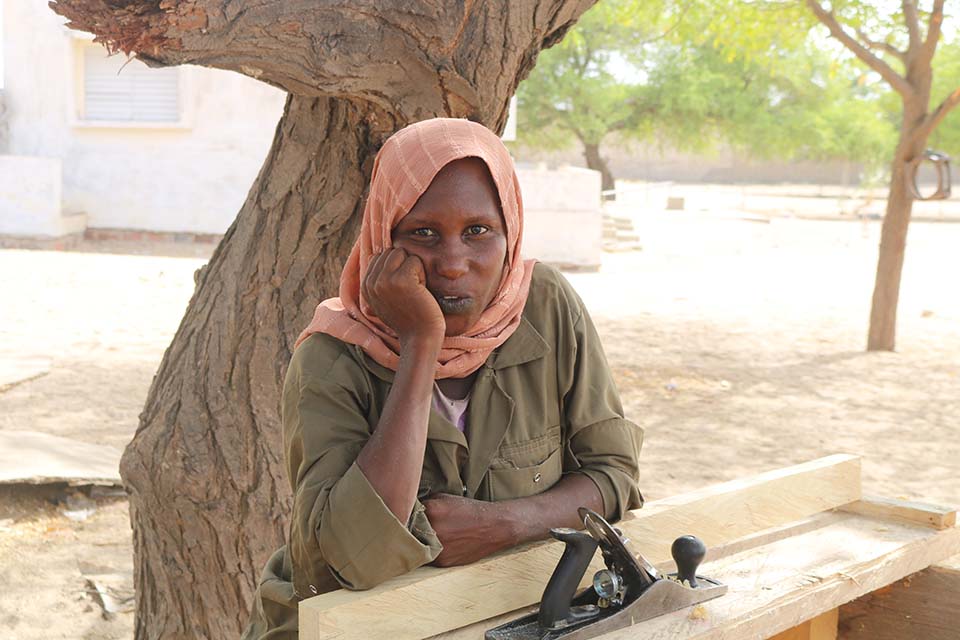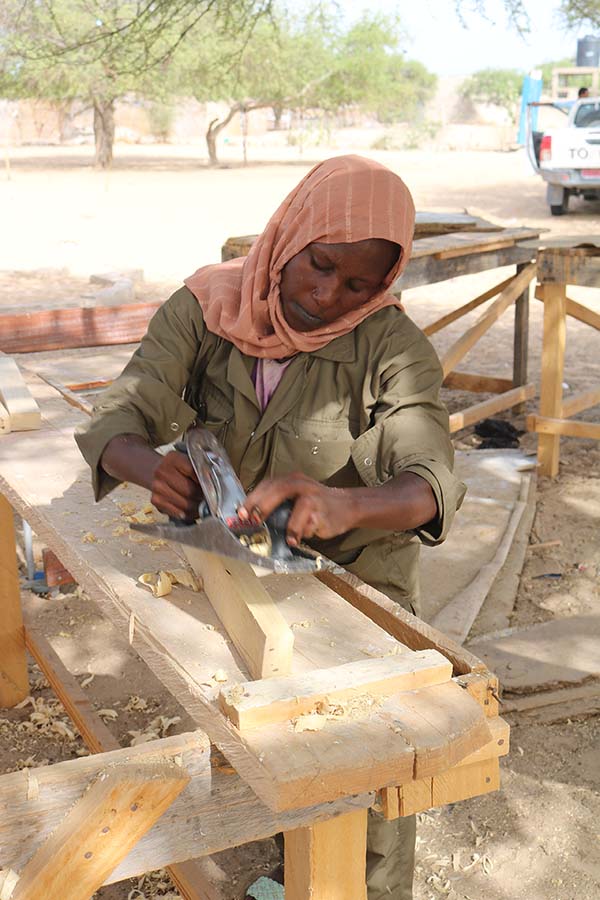
Building Resilience through Vocational Training in Chad
As the hot afternoon sun beats down in Bol, the capital of the Lac Region in Chad, 31-year-old Kakani Alhadji Abdou sits in the shade of an Acacia tree while working on a carpentry project. She is one of just a handful of female carpenters in the province.
“I had no notion of carpentry in the past, but thanks to this training, I made benches, closets, tables, chairs and cupboards, and my brothers and sisters in the village support me,” she says.

Kakani Alhadji Abdou trains at the vocational training center in Bol, Chad, where she completed a carpentry program through the StaR project.
Photo by Cara Bragg/CRS
The four-month training in which Kakani enrolled is part of the Stabilization and Reconciliation in the Lake Chad Region project, or STaR, implemented by Catholic Relief Services and local partner Caritas N’Djamena. The training has helped Kakani start a business to support her children.
When the Lake Chad Basin crisis broke out in 2014, Kakani lived on the border of Chad near Niger. Armed groups attacked the area, killing people, setting houses on fire and destroying communities. Kakani fled with her family to her home village of Moun-Dossouloum. Later, her husband went to Libya in search of work but did not return, leaving Kakani to find a way to provide for her children.

Kakani Alhadji Abdou works on a piece of furniture at the vocational training center in Bol, Chad, where she completed a carpentry training program through the StaR project. Photo by Cara Bragg/CRS
While in Moun-Dossouloum, Kakani attended awareness-raising sessions about the STaR project, which began in 2019. During the project’s first phase, she received seeds, tools and agriculture training and learned to grow crops for her family to eat as well as to sell for profit.
When the second phase of STaR began in 2021, Kakani wanted to advance her agriculture training to include livestock farming. But with no qualified trainer available to supervise her, she opted to learn carpentry instead.
“As a mother, I freely chose this trade to get to work and earn a living. My only concern is to find a job to feed my children,” she said. “I've benefited from this support, and I do it with love and passion.”
According to Kakani’s master trainer at the government-run Technical and Professional Training Center in Bol, she is a highly motivated and diligent student. In addition to learning carpentry, she has also built her knowledge of both French and Kanembou, a local language in Chad, so that she can better grow her business. Even before finishing the training, she was already spreading word about the services she could provide.
“Once I finish the training, I will set up in the village because I'm the only carpenter [there], and I'd have lots of customers as neighboring communities are already interested in my work.”
Patrice Danboy, a field staff for Caritas N’Djamena, says he is impressed by Kakani, calling her the “the pride of the village.” She was the only woman in the STaR project, and in the village, to become a carpenter in Chad.
“In life, there are no easy jobs, but if you commit yourself, you'll earn your keep,” Kakani says.
The Stabilization and Reconciliation in the Lake Chad Region, or STaR project is funded by the German Federal Ministry for Economic Cooperation and Development via the German Development Bank. Phase one started in 2019 in Chad, Niger and Nigeria, while phase two launched in September 2021 and expanded to include Cameroon. The STaR project focuses on infrastructure development and rehabilitation, economic revitalization, social cohesion and local governance. In Chad, CRS partners with Caritas N’Djamena to implement the project.

